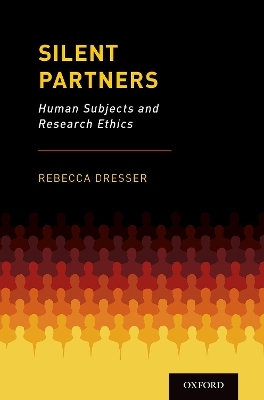
Silent Partners
Oxford University Press Inc (Verlag)
978-0-19-092918-3 (ISBN)
When is a human study ethical? For years, science and society have struggled with this question. Experts have put great effort into developing ethical principles and rules that adequately protect and respect volunteers in studies aimed at improving human health. But experts have missed something important. They have created a research ethics system without the help of people who know what it is like to be a research subject. This is a serious omission.
Experienced research subjects can make valuable contributions to research ethics. People who have been in studies have information about the experience that other people can overlook. Their experience as subjects gives them special insights into ethics, too. Experienced subjects also know about problems that can lead people to refuse to join studies, or drop out before studies are complete.
Scientists and ethicists often speak of subjects as partners in research, but the reality is quite different. Experienced subjects are rarely appointed to the advisory groups that create guidelines for ethical research, or to the committees that review individual studies to determine whether they meet ethical and regulatory standards.
A large body of work describes the perceptions and viewpoints of people who have participated in research. But experts rarely use this material to guide improvements in human subject protection. Although subjects have the power to decide whether to participate in a study, they have little control over anything else that goes on in research.
Silent Partners moves research subjects to the forefront. It examines what research participation is like for healthy volunteers and patients. It explains why subjects' voices should influence research ethics. Silent Partners shows how experienced research subjects can become real-not just symbolic-partners in research.
Rebecca Dresser has taught medical and law students about legal and ethical issues in biomedical research, end-of-life care, genetics, and related topics since 1983. From 2002-2009, she was a member of the President's Council on Bioethics and from 2011-2015, a member of the National Institutes of Health Recombinant DNA Advisory Committee. She is the author of When Science Offers Salvation (2001), editor of Malignant (2012), and co-editor of The Human Use of Animals (1998, 2nd ed. 2008) all published by Oxford University Press.
Contents
Preface
1 Subject Perspectives: The Missing Element in Research Ethics
2 Personal Knowledge and Study Participation
3 The Everyday Ethics of Human Research
4 The Hidden World of Subjects: Rule-Breaking in Clinical Trials
5 Participants as Partners in Genetic Research
6 Terminally Ill Patients and the "Right to Try" Experimental Drugs
7 Embedded Ethics in Developing Country Research
8 Research Subjects as Literary Subjects
9 How to Hear Subjects
Index
| Erscheinungsdatum | 02.11.2018 |
|---|---|
| Verlagsort | New York |
| Sprache | englisch |
| Maße | 208 x 137 mm |
| Gewicht | 417 g |
| Themenwelt | Medizin / Pharmazie ► Medizinische Fachgebiete ► Medizinethik |
| Studium ► Querschnittsbereiche ► Geschichte / Ethik der Medizin | |
| ISBN-10 | 0-19-092918-9 / 0190929189 |
| ISBN-13 | 978-0-19-092918-3 / 9780190929183 |
| Zustand | Neuware |
| Haben Sie eine Frage zum Produkt? |
aus dem Bereich


